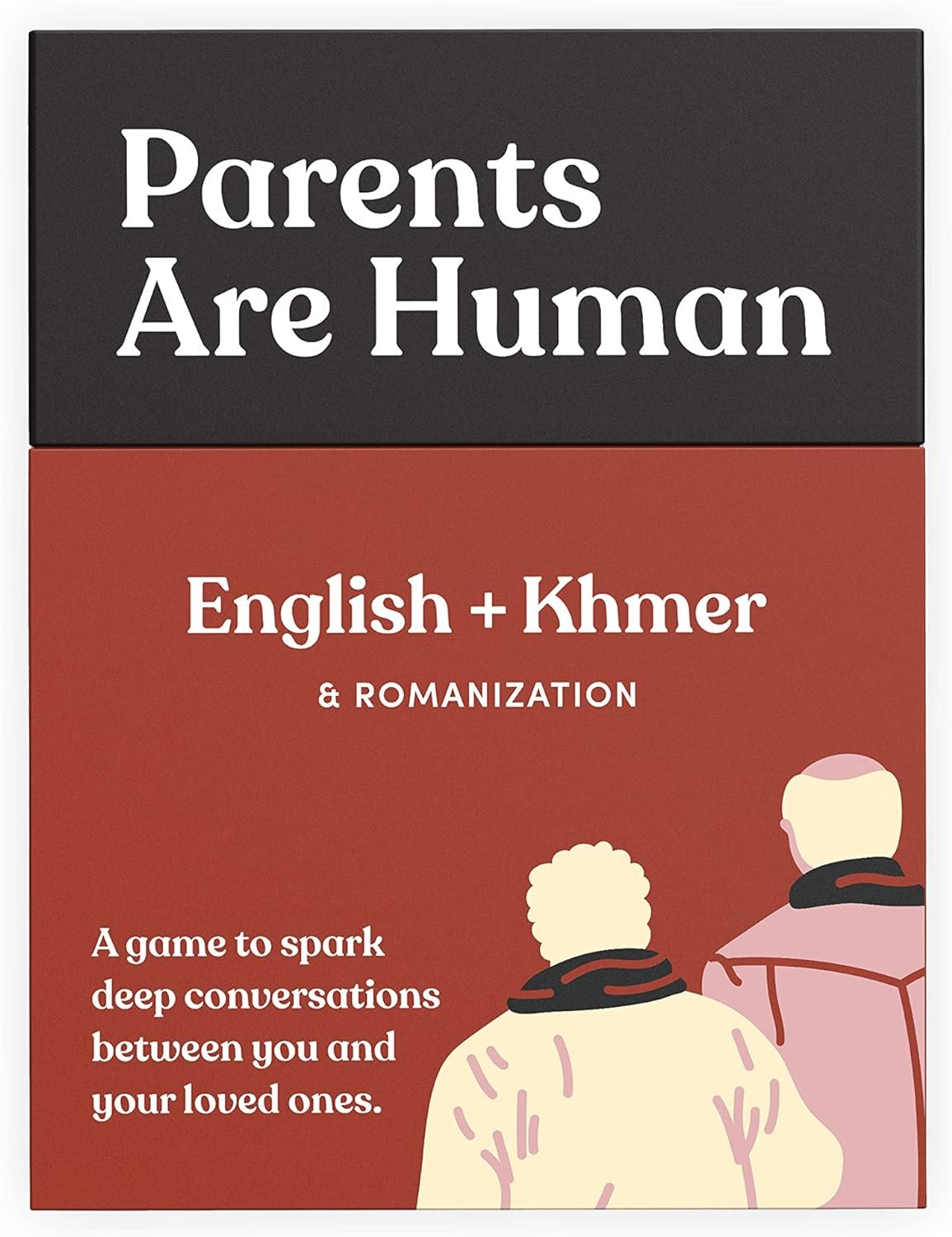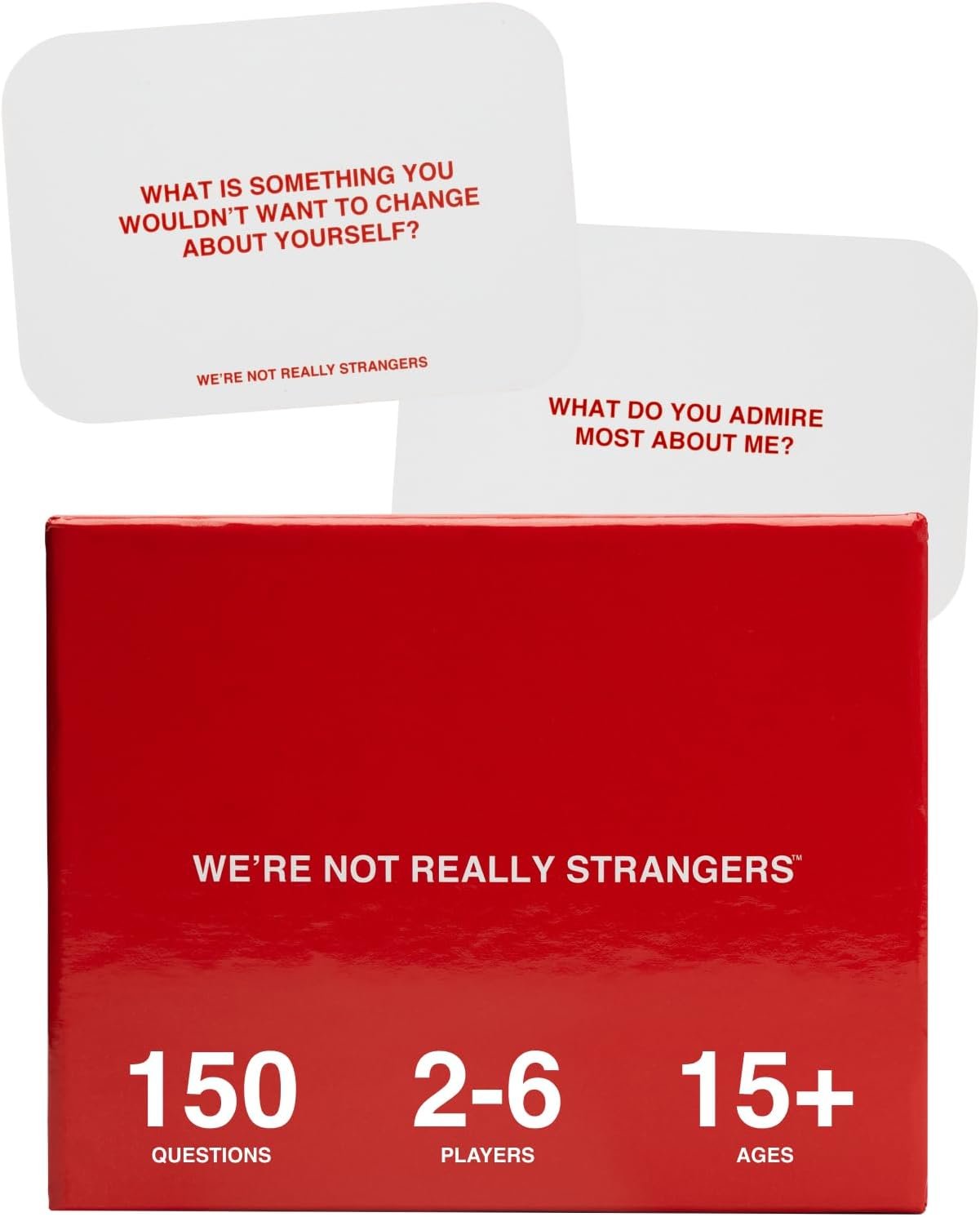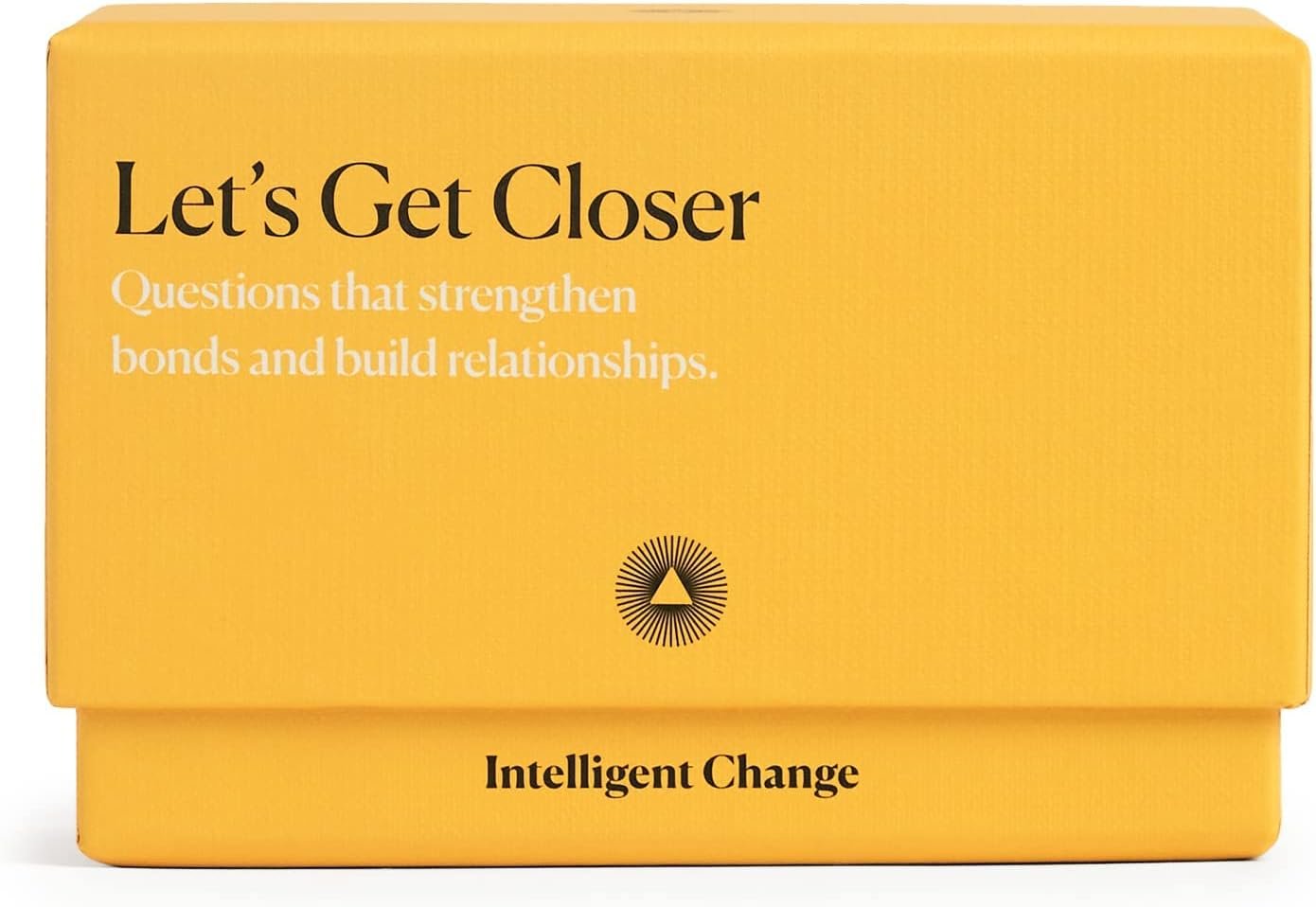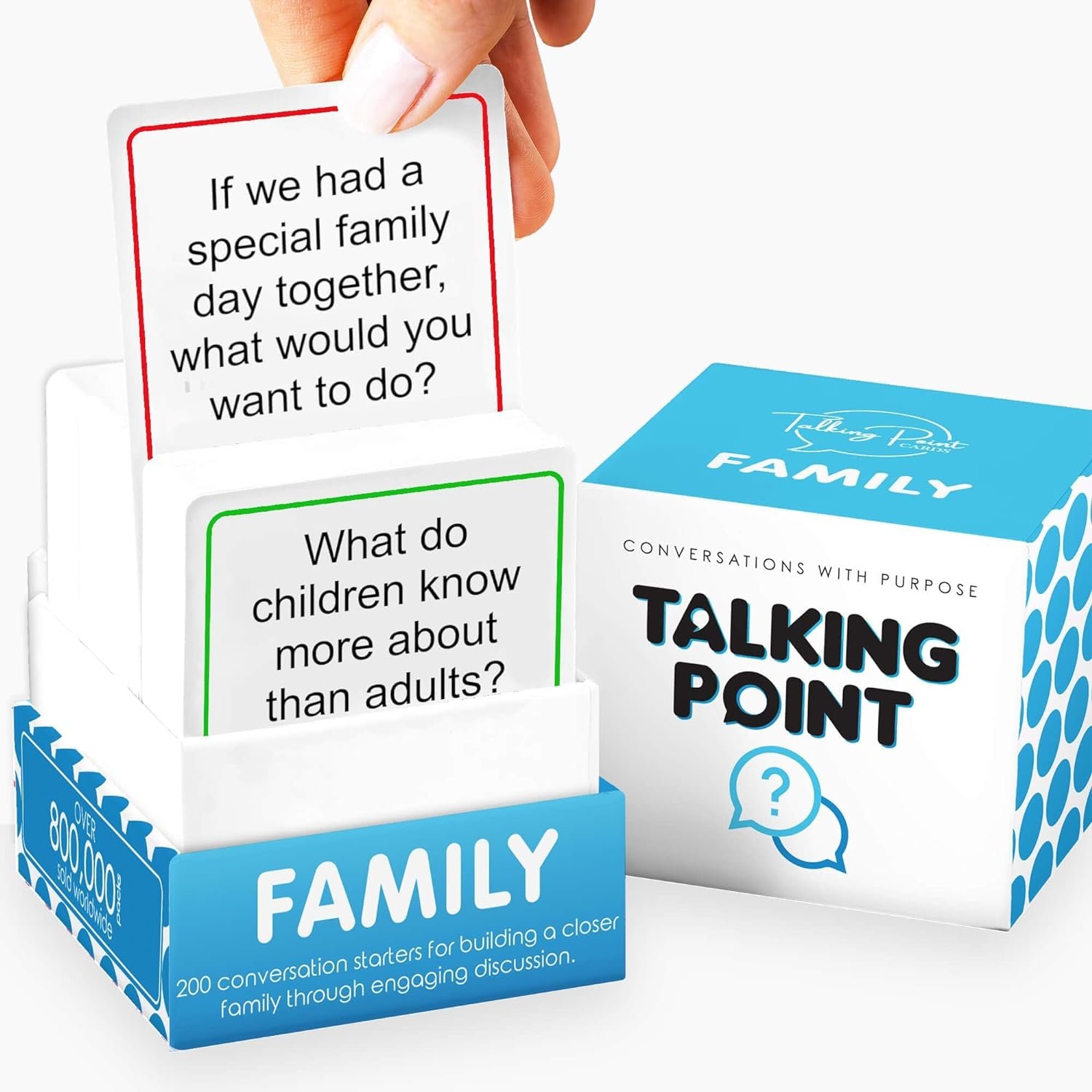Family conversation cards are a fantastic tool for sparking engaging and meaningful discussions among family members. These cards are designed to break the ice, deepen connections, and provide a fun way to learn more about each other. Here’s a look at five highly recommended family conversation card products, each offering unique features to enhance family time.
| Product | Questions | Unique Feature | Price | |
|---|---|---|---|---|
| Parents are Human |  | 45+8 Group Feel | Group engagement cards | |
| Spark Fun Talks |  | 50 | Sustainable & creative | |
| We’re Not Really Strangers |  | 150 | Deep vulnerability focus | |
| Let’s Get Closer Game |  | Multiple | Levels of intimacy | |
| Talking Point Cards – Family Pack |  | 200 | Covers 15+ areas |
Key Takeaways – Family Conversation Cards
- Diverse Options: There’s a wide range of conversation cards available, each designed to suit different group dynamics and conversation depths.
- Enhanced Connections: These cards are crafted to strengthen relationships through thoughtful and engaging discussions.
- Accessibility: Options are available for all age groups and situations, from intimate family settings to larger friend gatherings.
1. Parents are Human
Parents are Human cards aim to deepen understanding among friends, family, and coworkers. This set includes 45 question cards along with feelings cards that allow everyone to participate in answering particularly engaging questions. It’s perfect for small groups and designed to foster open and profound discussions in a comfortable setting.
- Engages small groups with deep questions.
- Includes special “Group Feel” cards for communal sharing.
- Portable and easy to use in various settings.
2. Spark Fun Talks
The Spark Fun Talks cards are designed to cultivate emotional well-being and connections through creative and thoughtful questions. This set includes 250 cards that progress through three rounds of increasingly deep questions, ideal for friends, family, or new acquaintances.
- Encourages deep emotional connections.
- Uses sustainable printing methods.
- Creative questions span three rounds for layered conversations.
3. We’re Not Really Strangers
We’re Not Really Strangers (WNRS) is designed to facilitate conversations that cut through small talk, encouraging vulnerability and genuine connections. The original set includes 150 carefully crafted questions, suitable for 2-6 players, with expansion packs available for various relationships.
- Promotes vulnerability and deep connections.
- Suitable for small groups.
- Expansion packs available for different relationship dynamics.
4. Let’s Get Closer Game
Designed for fostering meaningful connections, the Let’s Get Closer game offers a series of questions categorized into three levels of intimacy. This game is versatile, suitable for both light-hearted fun and deep conversations among two or more participants.
- Features three levels of intimacy for depth control.
- Suitable for two or more players.
- Encourages both light-hearted fun and deep discussions.
5. Talking Point Cards – Family Pack
Talking Point Cards are designed to reconnect families and create memorable conversations. The Family Pack includes 200 diverse prompts that cover over 15 important areas of life, making it an excellent tool for family dinners, road trips, or casual gatherings.
- Includes 200 diverse prompts.
- Covers more than 15 significant life topics.
- Designed by communication experts for all ages.
For more insights into personal development and mental health, you might find these articles useful: 7 Types of ADHD: Understanding the Spectrum, Demand Avoidance ADHD, Time Blindness: Navigating Through the Fog, Mental Instability: Navigating the Complex Landscape.
Detailed Questions Related to Family Conversation Cards
- How can family conversation cards improve communication within families?
- Family conversation cards are designed to initiate dialogue that goes beyond the routine exchanges often limited to daily activities or perfunctory inquiries about one’s day. These cards prompt participants to delve into more substantial topics, encouraging open communication and a deeper understanding of each other’s thoughts, feelings, and experiences. The guided questions help to break down barriers that might typically prevent family members from sharing more personal thoughts and feelings.
- These cards can be particularly beneficial in mixed-age groups where finding common ground might be challenging. They help each family member express themselves on an equal footing, with questions tailored to be universally relatable and engaging. By providing a structured way to converse, these cards diminish the hierarchy that sometimes silences younger or less outspoken members of the family.
- Utilizing these cards regularly can establish a routine that fosters greater emotional intimacy and understanding. This process not only strengthens family bonds but also equips all members with improved interpersonal skills that they can carry into other relationships and social interactions.
- Summary Points:
- Breaks routine exchanges and fosters deep communication.
- Encourages equality in family discussions.
- Regular use strengthens emotional bonds and interpersonal skills.
- What are the benefits of using family conversation cards during family gatherings?
- During family gatherings, conversation cards can serve as an excellent tool to engage everyone and keep conversations flowing smoothly and inclusively. They prevent the typical clustering of conversations where only a few dominate, ensuring everyone has the chance to speak and be heard. This inclusive approach can make gatherings more enjoyable and memorable for everyone involved.
- The cards often include a variety of topics that can cater to different interests, helping to bridge generational gaps. Whether it’s recalling fond memories, discussing future dreams, or debating light-hearted topics, these cards can cater to all ages and preferences, making them ideal for family reunions, holidays, or casual dinners.
- Moreover, these cards can help avoid the pitfalls of potentially contentious topics. By steering the conversation towards constructive and engaging topics, they help maintain a harmonious atmosphere at gatherings. This is especially beneficial in diverse families where opinions on certain topics might differ widely.
- Summary Points:
- Ensures inclusive conversations at gatherings.
- Bridges generational gaps with diverse topics.
- Steers conversations away from contentious topics.
- How do family conversation cards cater to children and teenagers?
- Family conversation cards are often designed with age inclusivity in mind, providing questions that are accessible and engaging for both children and teenagers. This inclusivity helps younger family members feel valued and heard, which is crucial for their self-esteem and development. The questions aimed at younger participants are usually framed in a fun and engaging manner, sparking their curiosity and encouraging them to participate more actively.
- For teenagers, who often retreat into their shells or prefer digital interaction, these cards can serve as a tool to express their thoughts and feelings in a safe and structured environment. The cards can help them articulate their views on various topics, including aspirations, fears, and personal beliefs, which might otherwise be difficult to express.
- Additionally, these cards provide an educational aspect, teaching children and teens how to communicate effectively, listen actively, and respect different perspectives. These are invaluable life skills that contribute to their social and emotional learning, preparing them for a range of future interpersonal interactions.
- Summary Points:
- Engages children and teens in family conversations.
- Helps express complex personal thoughts in a safe environment.
- Teaches effective communication and active listening skills.
- What are the unique features of the best-selling family conversation cards?
- The best-selling family conversation cards typically offer a mix of thought-provoking and fun questions designed to cater to a wide audience. These cards stand out due to their high-quality content that balances depth with accessibility, ensuring that participants from different age groups and backgrounds can engage equally. The top cards also often feature durable, aesthetically pleasing designs that make them physically appealing and easy to handle.
- Many popular sets come with guidance on how to maximize the benefits of the cards, including suggestions for game modes, rules for respectful discussion, and tips for keeping the conversation flowing. This additional content helps users get the most out of their purchase, providing more than just questions but a complete conversational experience.
- A defining feature of the best sets is their adaptability—they can be used in a variety of settings, from casual family dinners to more structured group therapy sessions. This versatility makes them a favorite among consumers looking for a product that can serve multiple purposes.
- Summary Points:
- Balance of depth and accessibility in questions.
- Durable and aesthetically pleasing designs.
- Versatile use across various settings.
- How can families integrate the use of conversation cards into their daily routines?
- Integrating family conversation cards into daily routinescan be an effective way to enhance family interaction and communication. Establishing a routine, such as having a ‘question of the day’ at dinner, can provide regular opportunities for family members to share their thoughts and feelings. This routine helps create a habit of engaging in meaningful conversations, which can strengthen relationships and improve communication skills.
- Setting specific times, like during dinner or car rides, for using the conversation cards can help in making their use a regular part of family life. These cards can serve as a fun and insightful activity that all family members look forward to, making everyday routines more engaging and interactive.
- Another way to integrate these cards is by using them during family meetings or special family nights, dedicated to bonding and communication. This can help address specific topics that require more attention, such as plans for family vacations, changes in household rules, or discussions about any issues members might be facing.
- It’s also beneficial to encourage all family members to participate in choosing the cards or questions to be discussed. This fosters a sense of ownership and inclusiveness, making the conversation more engaging for everyone. It also allows family members to bring up topics they are curious about or feel are important, enhancing the relevance and depth of discussions.
- Summary Points:
- Establish a routine for regular engagement.
- Utilize cards during special family times or meetings.
- Involve all family members in choosing topics to enhance inclusiveness and relevance.
10 FAQ Questions with Brief Responses
- What are family conversation cards?
- Family conversation cards are decks of cards with questions or prompts designed to encourage open and engaging discussions among family members.
- How do family conversation cards benefit family relationships?
- They promote understanding, strengthen emotional connections, and improve communication skills among family members.
- Can family conversation cards be used with young children?
- Yes, many decks are designed to be family-friendly and can include questions suitable for children, helping them develop their communication skills early.
- Where can I buy family conversation cards?
- These cards are available at various online retailers, bookstores, and sometimes at local game and hobby stores.
- Are there digital versions of family conversation cards?
- Yes, some brands offer digital versions or apps that can be used on smartphones or tablets, providing a portable and convenient option.
- How often should we use conversation cards?
- The frequency can vary, but using them during regular family dinners or weekly family nights can provide consistent benefits.
- What makes a good family conversation card?
- Good cards typically feature a mix of fun and deep questions that are open-ended and suitable for all ages, sparking interesting discussions.
- Can these cards be customized?
- While most come pre-made, some companies offer customizable packs where you can add your own questions or select themes that best fit your family’s interests.
- How do you keep the conversation positive and constructive?
- It’s helpful to set ground rules for respectful listening and speaking, ensuring that everyone feels safe and valued during the discussions.
- What do I do if a conversation becomes too intense or emotional?
- It’s important to acknowledge the emotions and, if necessary, take a break and revisit the conversation later, possibly with adjustments to the discussion guidelines to maintain a supportive environment.
These tools are a fantastic resource for families looking to enrich their communication and foster a closer, more understanding relationship with each other.

